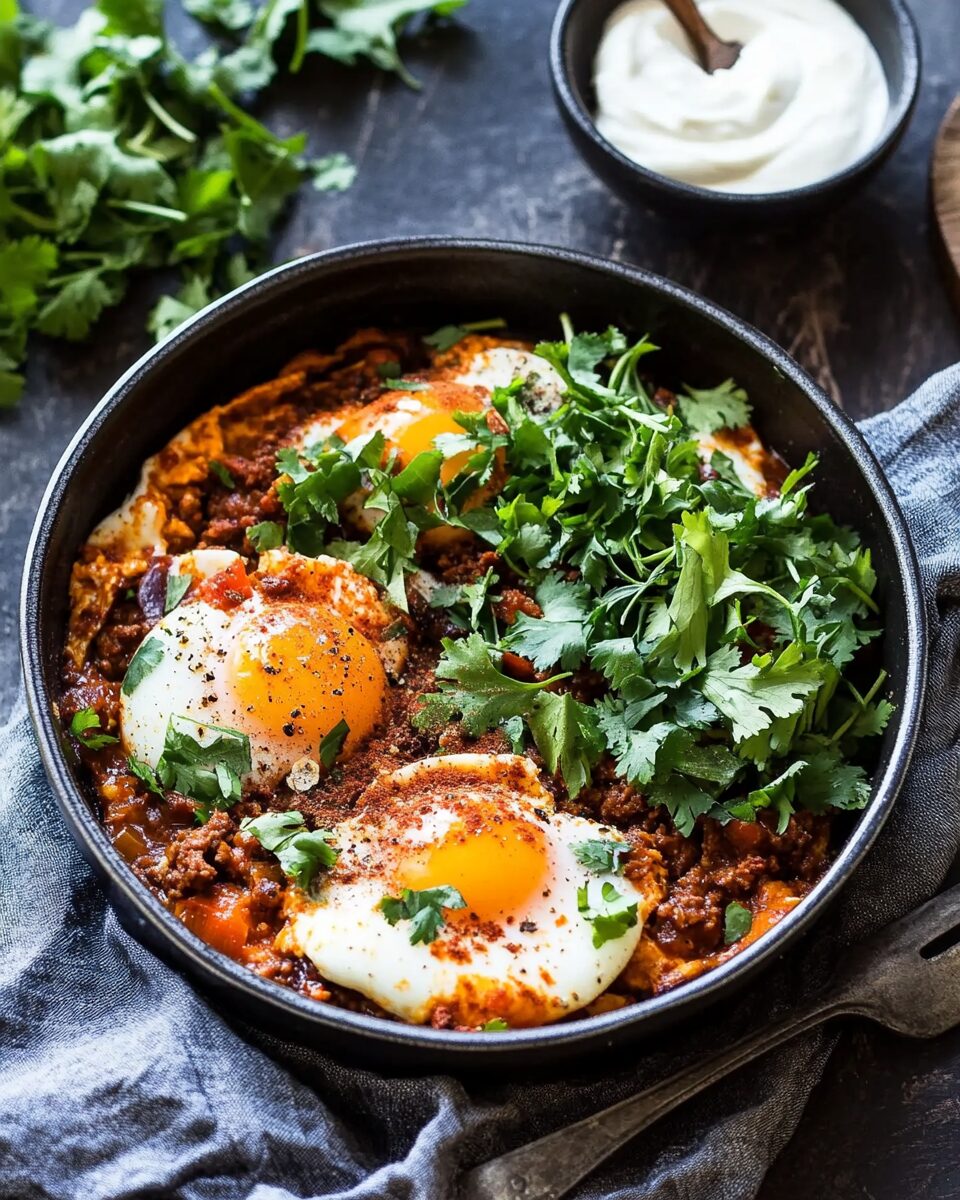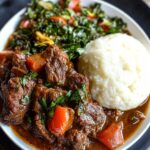The Essence of Moroccan Flavor
Moroccan cuisine is built on the principles of layering spices, balancing warmth with brightness, and combining savory notes with subtle hints of sweetness. This dish stays true to that philosophy. It features a foundation of aromatic whole spices—fennel, cumin, and caraway—that are gently toasted to enhance their natural oils and depth. Ground spices like cinnamon, smoked paprika, and additional cumin add complexity and a warm earthiness that permeates the lamb and tomato base.
Aleppo chili flakes offer a nuanced heat with fruity undertones, elevating the flavor profile without overwhelming the palate. Combined with a touch of salt and the richness of fire-roasted tomatoes, the result is a robust stew that forms the perfect bed for softly baked eggs.
Spinach is added to bring a note of freshness and color while balancing the richness of the meat. It also boosts the nutritional profile of the dish, making it a hearty yet wholesome meal that feels indulgent without being heavy.
A Delicious Alternative to Shakshuka
While Moroccan Eggs are often compared to shakshuka—a popular Middle Eastern dish of eggs poached in a spiced tomato and pepper sauce—this version distinguishes itself through the use of lamb and a deeper spice blend. The use of ground lamb introduces a luxurious, meaty element that adds substance and umami richness. The spices here are bolder and more layered, leaning into the Moroccan tradition of combining sweet and savory spices in the same dish.
Where shakshuka is light and bright, Moroccan Eggs are deeper, richer, and more rustic. It’s a dish that feels appropriate for cooler months and cozy meals, yet still remains light enough to enjoy year-round. The inclusion of harissa yogurt as a topping also introduces a creamy, cooling contrast that tempers the boldness of the stew while enhancing its flavor.
The Role of Harissa Yogurt
No Moroccan-inspired dish would be complete without harissa—a chili paste native to North Africa known for its smoky, spicy flavor and vibrant red hue. In this recipe, harissa is mixed with plain yogurt to create a cooling sauce that complements the warmth of the stew. This contrast in temperature and flavor—cool and spicy, creamy and savory—adds an elevated touch to the finished plate.
Harissa yogurt can be customized to taste, depending on how spicy or mild you prefer your dish. For a richer flavor, a dollop of full-fat Greek yogurt is ideal, while a lighter version can be made with low-fat or plant-based alternatives. The versatility of this topping also means it pairs beautifully with other Mediterranean and North African dishes, making it a staple worth keeping in your culinary repertoire.
Perfect for Brunch or Dinner
Moroccan Eggs are an incredibly versatile dish. Served in the skillet or in individual portions, they are ideal for a weekend brunch that impresses without stress. The eggs bake directly into the stew, eliminating the need for additional pans or complicated timing. Simply crack the eggs into small wells in the lamb and tomato mixture, place the skillet in the oven, and let the heat do the rest.
For dinner, this dish holds its own as a satisfying main course. Pair it with warm flatbread or crusty sourdough to scoop up the stew, and add a side salad of cucumbers, red onions, and lemon vinaigrette for a complete meal. It also works well as a centerpiece for a mezze spread, accompanied by hummus, olives, and marinated vegetables.
The richness of the lamb combined with the vibrant spices and runny yolks makes it a dish that satisfies on multiple levels. It’s hearty enough for colder nights yet light enough not to weigh you down.
A Nutritional Powerhouse with Bold Ingredients
Beyond its delicious flavor, Moroccan Eggs are a nourishing meal packed with protein, vitamins, and healthy fats. Ground lamb offers high-quality protein and essential minerals like iron and zinc. Eggs bring additional protein, as well as choline, which supports brain health.
The use of fire-roasted tomatoes boosts the dish’s vitamin C and antioxidant content, while spinach contributes folate, fiber, and a dose of iron. The yogurt topping not only adds creaminess but also introduces beneficial probiotics, especially when using a live-culture yogurt.
Despite its luxurious feel, the dish clocks in at just over 300 calories per serving, making it an excellent choice for anyone looking to enjoy a flavorful yet balanced meal.
Tips and Tricks for the Best Results
To get the most flavor from your Moroccan Eggs, start with high-quality ground lamb. The richness and natural fat content of lamb are key to the dish’s hearty character. Be sure to toast the whole spices briefly before cooking—this unlocks their essential oils and intensifies their aroma.
When cooking the lamb and onion mixture, take the time to allow the ingredients to fully brown and caramelize. This step builds the foundation of flavor that sets the stew apart. Simmer the tomato mixture long enough to allow the flavors to meld, and adjust the consistency by adding a little water as needed.
When baking the eggs, keep a close eye on them. The goal is for the whites to be set while the yolks remain slightly runny. This texture contrasts beautifully with the soft stew, creating a luscious, spoonable meal that feels both elegant and rustic.
For presentation, serve the dish directly from the skillet with a generous swirl of harissa yogurt and a scatter of fresh herbs. A sprinkle of extra Aleppo flakes adds color and a final touch of heat.
Conclusion
Moroccan Eggs are a culinary journey in a skillet—a dish that brings the vibrant, spice-rich traditions of North African cooking to your home kitchen. With tender lamb, aromatic spices, rich tomatoes, and creamy baked eggs, it’s a meal that satisfies the soul and delights the senses. The added touch of harissa yogurt enhances both flavor and presentation, making each bite a perfectly balanced harmony of warmth, creaminess, and gentle heat.
Whether served for a weekend brunch or an adventurous weeknight dinner, Moroccan Eggs are sure to become a favorite. They’re impressive yet approachable, deeply flavored yet light on the palate, and packed with nourishing ingredients that make you feel good from the inside out. Once you try this dish, you’ll find yourself returning to it whenever you crave something bold, comforting, and utterly unforgettable.






